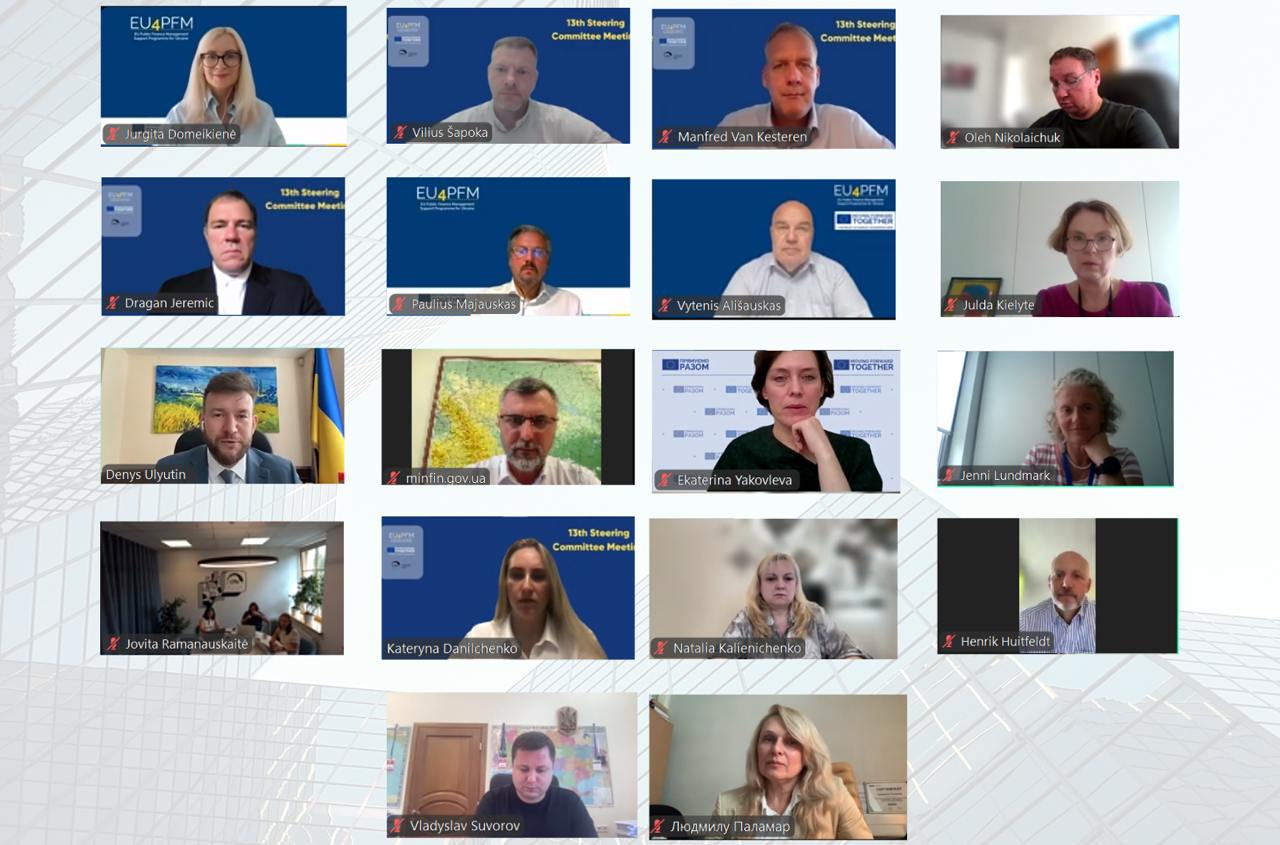EU4PFM Highlights Key Achievements at 13th Steering Committee Meeting
Launch of new Customs Code development, international operation of NCTS Phase 5, and development of Budget Declaration using IT solution for budget planning represent key achievements in the first half of 2024 of the EU4PFM Project and its Partners.
EU4PFM Team Leader Jurgita Domeikiene announced this today at the 13th Steering Committee Meeting. They will become significant milestones in Ukraine’s EU accession process, as official negotiations were launched on June 25th by intergovernmental conferences. These developments have also influenced the Project’s activities, with assistance provided to Partner Institutions during preparation for the Explanatory meetings as an introduction to the screening process.
As per tradition, the event brought together EU4PFM Partner Institutions — the Ministry of Finance, the State Tax Service, the State Customs Service — as well as representatives from the European Delegation to Ukraine, the Directorate-General for Neighbourhood and Enlargement Negotiations (DG NEAR), and international experts. The meeting aimed to discuss the Project’s results achieved in the first half of 2024 and activities to be finalised in the current EU4PFM phase.
First Deputy Finance Minister of Ukraine, Denys Uliutin during his welcome address thanked the teams of the EU Delegation and EU4PFM for their continuous comprehensive support and for developing the necessary preconditions for Ukraine’s accession to the European Union:
“For 2.5 years, together with our international partners, we have been improving and reforming our public finances under the extreme conditions of war. Daily efforts to find internal and external resources for essential defence and social spending are combined with the restoration of medium-term budget planning at both the state and local levels. We are working on a large-scale reform of public investment management, transformation of the tax and customs authorities, and development of management accountability in line with European standards”.
Commenting on the results of the joint work, the First Deputy Minister of Finance noted that the Budget Declaration for 2025-2027 has been approved by the Government and submitted to the Parliament, and amendments to the Budget Code to restore medium-term budget planning at the local level will be considered in Parliament in the near future:
“We have also made significant progress in the development of a new, modern IT system for planning and monitoring the implementation of the state budget. The piloting of the new information system for online interaction between the Ministry of Finance and spending units “GRK-WEB” has been completed and the system has been put into trial commercial operation. Proposals for the Budget Declaration were collected through this system. The development of three modules for the IT system of the Ministry of Finance has been completed and they are currently being tested,” Mr Uliutin added.
For his part, Deputy Minister of Finance Oleksandr Hrubiian emphasised that each project implemented with the support of EU4PFM is essential for the of support Ukraine’s financial system:
“The Budget Planning and Monitoring System, which consists of two subsystems, is a new philosophy of budget planning. It creates a whole ecosystem that allows the Ministry of Finance to work with spending units through a single, legally significant, electronic window. Today, all documents are submitted to the Ministry of Finance in electronic form only. In addition to the budget process, we have already applied the platform of the GRK-WEB subsystem to the monitoring of social payments and are now applying it to the Reform Matrix. We are grateful to the EU4PFM experts for their support during a difficult period of war for our country,” concluded Mr Hrubiian.
As of now, 90 percent of activities planned in the EU4PFM Work Plan are completed or in progress. This represents a positive outcome for the Project Team, considering that 10 percent of activities were suspended or postponed due to martial law.
Henrik Huitfeldt, Head of the Section for Public Finance, Business Support and Social Policies at the EU Delegation to Ukraine, noted that the Project is reaching the end of its current phase and stressed that the priority is to finalise ongoing activities and achieve performance objectives towards the year’s end:
“We’ve sustained good progress in implementing all activities over the past six months,«Mr. Huitfeldt continued. «I’d like to highlight some key project achievements since the beginning of 2024. These include the start of the international operation of the NCTS Phase 5 under the Common Transit Procedure, the successful completion of preparatory work for the exchange of information on financial accounts and the development of the Medium-term Budget Declaration for 2025–2027 using an integrated IT solution for budget planning, which fulfils one of the indicators of the Ukraine Facility Plan.”
Julda Kielytė, Team Leader of the Social and Economic Policies at the DG NEAR, Unit E2 Economic and Sectoral Policies, emphasised the EU’s commitment to supporting Ukraine in all its endeavours. On June 25th, the first intergovernmental conference was held, deciding to open accession negotiations with Ukraine:
“Last week, we held the first bilateral screening meeting on Chapter 5, Public Procurement. These bilateral screening meetings will continue in autumn, with a particular focus on assessing Ukraine’s legal alignment, administrative capacity, and future plans in each Chapter. So it’s crucial to gain a clear understanding of Ukraine’s progress in aligning with the EU acquis, and this preparation needs to be intensified“.
For the second half of 2024, EU4PFM Team Leader Jurgita Domeikiene informed the participants that the Project will focus its efforts towards assisting with screening and negotiation-related activities. This will support Partner Institutions in aligning Ukrainian legislation with the EU acquis in the Public Finance Management area. Strengthening the administrative capacities of Partner Institutions in activities that could influence the assessment of progress during the negotiation process (governance, strategic planning, fighting corruption, staff competencies, especially in customs) will also be a key focus area for EU4PFM.
The final Steering Committee meeting of this EU4PFM phase is scheduled for February 2025.


